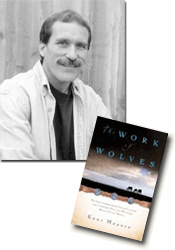 An Interview with
An Interview with
Kent Meyers
Interviewer Luan Gaines: Is The Work of Wolves inspired by a real event? If so, can you describe it?
Kent Meyers: The germ of the story—the starved horses and young men who try to do something about them—is from a story I was told, very skeletal and distant. I recognized serious tensions in it and asked the teller whether I could try to turn it into a short story. But when I began the story, it quickly grew into a novel, expanding beyond my expectations. So there is this “first story” that grounds the novel, and there is also the fact that, if you live in the American West, every year you will read newspaper accounts of someone starving whole herds of horses. It’s always puzzled and intrigued me—what is this strange relationship we have with horses that leads us to ennoble them—and then, at times, abuse them?
There are also other “groundings” in the book: Willi’s father’s story has some basis in a story I heard (though I discovered the Lebensborn project in the course of research) and of course Goat Man, as I mention in the “Acknowledgements,” comes from work I did with fourth graders.
We first meet Carson Fielding as a teenager, but he is already showing the independent spirit that will characterize his adult life. Does this quality come from working the land or is it of a more personal nature? Please explain.
Certainly Carson is idiosyncratic, his own individual self. At the same time, I do think that working land, being responsible for animals, “knowing death,” as he puts it to his mother, can lead, in a general way, to the kind of character that Carson exhibits in this novel. While he may represent a certain extreme of independence, I know young men like this in the classes I teach, and in my travels around South Dakota. Open spaces, land, animals, responsibilities at an early age—these things foster an independence of spirit and a sense of self.
Magnus Yarborough takes Carson's measure from the first meeting. What is it about Carson that intrigues Magnus? Why?
I think that what intrigues Magnus initially is a radical innocence in Carson—a directness so acute that Magnus’s wiles and tricks and subtleties have no effect. That is what makes that opening prologue comic—that Carson “wins” by merely being who he is, and by a deeper understanding than Magnus has of the animals themselves, though he has a poorer understanding of business dealings. I don’t think Magnus can quite understand what happens to him in that scene—and because he needs control, that inability to understand won’t allow him to forget either. At least that’s one way of looking at that scene.
You combine disparate elements to create a powerful drama, four young men united in a common purpose. How pivotal is Earl Walks Alone's first sight of the horses and his decision to locate them to the unfolding plot?
The end of Earl’s first chapter says something like “Earl didn’t know it then, but he had just walked into Carson Fielding’s story.” The novel, in many ways, is “about” boundaries and boundary crossings—the ways that in fairy tales we cross into other worlds, the ways that in meeting strangers we join their stories, briefly, while they join ours, and both stories are changed, and of course the ways that cultures and histories, at the wider level, intersect and influence each other. In this sense, then, Earl’s going to the horses, and by so doing inadvertently “entering” Carson’s story, is the beginning of the novel.
Injecting another culture into the plot, history in the Nazi's past, Willi speaks about German interest in the Lakota culture. Can you explain this phenomenon and the reasons for the interest?
Every year thousands of Europeans, Germans in particular, come to South Dakota as tourists to Lakota culture. I traveled in Germany to research the novel, and saw signs of this interest all over. And I talked to many people about it. The most obvious reason for it is Karl May, a writer I mention once in the novel. May was a German writer who wrote novels about frontier America, involving a German frontiersman and a young Indian brave—Old Shatterhand and Winnetou. While May got many things wrong—he never even visited the United States—his novels have been immensely popular in Germany, and they influenced the imaginations of many people.
Deeper reasons suggested to me by various people in Germany are that German people do feel guilty about WWII, and in identifying with Native peoples, whom they see as repressed by a dominant culture, they relieve some of that guilt. There is also the fact that Germany is highly industrialized, but Germans like to believe they’re close to nature—and identify with American Indians for that reason. Of course, this expectation isn’t necessarily met. One German woman currently living on the reservation told me that she had thought she would be coming to a pristine and natural place, and she had to severely readjust her expectations when she discovered that the reservations, while full of land and space and nature, have garbage and litter problems, and junked cars. And of course the novel, in various ways, deals with this difference between our idealizations of other people and their reality.
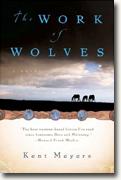 Willi also adds another plot element, the existence of psychological cages that people allow to determine their actions. How does this concept apply to ordinary lives?
Willi also adds another plot element, the existence of psychological cages that people allow to determine their actions. How does this concept apply to ordinary lives?
In a sense Willi’s grandmother is right: we are all caged by history, society, family, genes. Her failure is in believing these things are fully deterministic and that imagination and possibility don’t exist. As a result she “cages” herself even more fully than she knows—locked in her house, in her past, in her lost dreams. What the novel suggests is that people do have the ability to cross boundaries—and imagination is one of the major vehicles by which we do so, whether in art or in just meeting others, being open to them and their ideas—and this crossing of boundaries and use of imagination opens our cage doors. Like the white bird, we can choose to stay in our cages—but that is a choice, not in the nature of the cage itself.
I believe that we live in an age where imagination—as opposed to “reason” or “logic” or “psychological determinism”—is perhaps our most crucial intellectual resource. More and more we are being told that we are creatures of our genes and our histories, but in my experience imagination has the power to float free of these things, to shatter and re-create, to change the narratives and structures of our lives in ways simply not predictable by the “cages” Willi’s grandmother is obsessed with. Given this belief, of course, it troubles me that higher education seems to be moving away from the liberal arts—which put an emphasis on educating the imagination—and toward more “practical” fields.
Each of the four young men is confronting a personal challenge. How are these issues similar for Carson, Earl, Ted and Willi? Of the four, who has the most to gain? The most to lose?
This seems like something people could discuss for hours and never reach full consensus. To refer back to question 6, each of the four young men uses imagination to enter the other stories, and out of that a larger, single story, involving all of them, is formed. In that formation, they each change the former arc of their lives and break free of certain cages—though to a greater or lesser extent. But if I try to work all this out, I’ll be writing until next year! How do you compare, for instance, Ted’s contemplation of suicide on the frozen lake—the possible loss of his life—with Willi’s threat of being “devoured” by the Hansel-and-Gretel witch his grandmother is? And that’s just one of the possible pairings you’d have to work out.
Carson finally views his parents as living on their own island, their subtle communications both comforting and precious. Why does he choose to remain separate, even though the information he holds may change their decision to sell the ranch?
In this scene, Carson recognizes his parents as fully separate from him, and he honors that recognition. I’m not sure he’s right to do so—and neither is he, later in the novel. But if the novel is about crossing boundaries, it is also about respecting them, knowing when they ought not be crossed. I suppose this scene, in its moral ambiguity—and I hope it is ambiguous—raises that question. If you look at the discussion of selling the land that he has with his parents, it seems—to me at least—that, while sentimentality favors Carson, his parents’ arguments are good ones, solid ones, sensible ones. Take Magnus Yarborough out as an emotional force, and it’s hard to know what should be done or who is right. Perhaps Carson, deep down, recognizes this—and chooses not to cross to that private island with that emotional burden.
Both Carson and Rebecca mature during the course of her riding lessons. Why is Carson able to share with her what he has never spoken of to anyone else? What quality in Rebecca allows Carson to confide in her?
Well, she’s a woman, and a beautiful one, and he’s attracted to her, and such things lead to intimacy! That’s the most obvious answer, I guess, and perhaps enough of an answer to carry the entire question. Sometimes it’s best just to leave things simple!
But there’s also a shared need between them, each having in his/her own way become isolated, Rebecca because of Magnus, Carson because of his nature and the land all around him. I suspect they recognize this quality in each other and respond to it, identify with each other, and draw each other out. Invulnerability is, in human relationships, a weakness, and what Rebecca does is break through Carson’s invulnerability—a thing his mother cannot do—and allow him to grow, to step outside himself. And she does this partly by telling him her own story and then standing up to any easy understanding he attempts. And he, for his part, allows her to see herself as worth more than the value Magnus assigns to her. Once such mutual things begin to happen in human relationships, particularly ones where sexual attraction is a force, great momentum is generated.
And then of course there is the act of “doing” something together. While it’s a humorous scene when Carson tells Magnus to “make it another horse” in terms of “training” Rebecca to ride, the truth is that Carson understands the horses as his equals. They train him as much as he them, and the learning is mutual. Once Carson backs Rebecca out of the corral and she recognizes this sense of radical equality in his outlook—he doesn’t care that she’s Magnus’s wife; he cares only about the horses (and by implication, her)—the ground is established for their mutual influence.
Carson considers that he and Rebecca are drawn together because of Magnus, that her husband may be a contributing factor in their attraction. What does Magnus' implied presence portend for any relationship they might have in the future?
The end of the novel is essentially given to Rebecca. Whatever happens between them—and I don’t know what does and don’t have much interest in figuring it out—it will happen because of Rebecca. And she is given the freedom to make that decision when Carson returns to Magnus and confirms her story. In so doing, he frees her—by an act of imagination rather than of violence—of that particular cage. I’ve had some readers bothered that Rebecca doesn’t re-enter the novel as a force at the end, but the way I see it, her force extends beyond the ending of the novel, and it is extended through Carson’s act, and the relationship he has with her. I don’t know what Rebecca does—but Carson does give her the opportunity to be free of Magnus’s power and presence. And that strikes me as crucial, and the way Carson does it is crucial—with language, with play, with the rejection of violence.
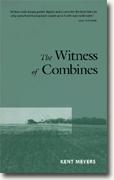 Earl Walks Alone experiences a kind of epiphany when he, Willi and Carson find the three penned horses on Magnus' ranch. Earl feel that time is standing still, "a time when genes of horses and men had not yet differentiated and there was only potential and spirit." Why is this a pivotal moment for Earl?
Earl Walks Alone experiences a kind of epiphany when he, Willi and Carson find the three penned horses on Magnus' ranch. Earl feel that time is standing still, "a time when genes of horses and men had not yet differentiated and there was only potential and spirit." Why is this a pivotal moment for Earl?
This sentence, this scene, is crucial in the novel because, when we recognize a suffering deeper than, and extending beyond, our own individual differences, and we accept the enormity of that suffering, we are in fact bound by it. This, too, is an imaginative act. To recognize suffering in another species, to accept it, and to accept responsibility for it—this binds us together, binds together these three vastly different young men. It’s not just Earl for whom this is pivotal, though this section is written from his point of view. It’s all of them. Suffering has the potential to bind us together (you left out the word “fealty” from the quote, but it’s needed). But we have to allow ourselves to stand before it, open-faced, and accept it for what it is. When we do, differences disappear, leaving “potential.”
What is the significance of the horses to each of the following: Carson, Magnus, Earl Walks Alone and Ted Kills Many?
To Carson they’re equals. To Magnus they’re possessions to be controlled and manipulated. To Earl they’re a way back to his heritage. To Ted they’re spiritual beings.
I don’t know! But those are pretty good guesses, aren’t they?
Yarborough represents the thoughtless greed of unrestricted power, the ability to purchase anything and anyone. How do the young men's actions finally thwart his machinations and how significant is their moral victory?
I’m not sure, frankly, that they do thwart his machinations. It would be nice to think that a moral victory is a practical victory, but I don’t know that it is. It seems more important to me that the young men do “the work of wolves” not against Magnus, but for the horses. That is their focus—the dumb, brute beasts who can’t speak for themselves. If the young men did what they did in order to thwart Magnus, they’d be using the animals as pawns just as surely as he is—for an ulterior purpose. If there is a moral victory in the book—and I’m a bit uncomfortable thinking in those terms—it lies in the fact that the young men stay focused on the horses, not on Magnus. This focus isn’t easy to maintain, and they are tempted to break it, but they don’t.
The book is in many ways an “anti-western.” In a typical western the young men would use violence against violence—what Richard Slotkin calls “regeneration through violence,” and “thwart” Magnus (perhaps by killing him), thereby getting rid of evil. I think what this novel does is something far more subtle than that. In a sense, the young men don’t even respond to Magnus; they ignore him—which is what Carson recognizes really bothers him at the end—and stay instead with the powerless and the suffering. This may or may not be a “moral victory,” and it may or may not be a practical victory—but I hope the novel isn’t trying to give an “answer” to these issues but instead work with ambivalence and ambiguity.
Yarborough is Carson's nemesis, although Fielding has never sought any confrontation. Eventually Yarborough becomes his own victim. What is the lesson in such obsessive control?
The question states its own answer—control becomes the biggest cage of all. Nothing locks you away from others and from a full ability to be open to the world than excessive control does. Surely we all need some control over our lives. But when that control extends to other lives, when we see all lives as somehow impinging on and impoverishing our own—as opposed to enriching them—and try to control that impingement, we become truly impoverished. If we compare Carson with Magnus, Magnus is left with nothing but material wealth—and I mean this in two ways: that he literally has nothing but material surrounding him, but also that he has reduced non-material things—horses, people—to materiality. It’s immensely ironic, really—he turns everything into “wealth,” and thus is absolutely impoverished. Carson on the other hand, is left with “nothing”—except understanding, three new friendships, and potential—and I think any reader would understand that somehow he’s vastly “richer” than Magnus.
Earl's uncle and mother are kept apart by a bitter past. What change occurs in Earl that enables him to step up and bring those he loves together?
When Earl swears at his mother, he changes their relationship. One of the themes of the novel is how we use language and what its various powers are. For Earl, that simple thing—of taking on the language of the outsiders, the others, of Carson and Ted—and of using it to call his mother’s attention to himself as a person and an individual not, in fact, caged by his past or his father’s death, allows Earl to stand apart from his mother and see her with a new wisdom and strength. And it allows her to see him in the same way.
Profanity by its nature breaks down the “sacred”—and sometimes we make things sacred that ought not to be. Lorna has done this—made a kind of “shrine” of her husband’s death and pinned herself and Earl to it. Earl’s profanity—this new language borrowed from what we might think of as his new family, the other three young men—is just enough to shatter the set structure that has become Lorna’s “myth,” if you will, or her personal sacred story.
And Norm, of course, helps with this too, by letting Earl in on the stories of his past that Lorna tries to keep from him, while at the same time accepting Lorna’s decisions. In this sense, Norm, too, is changing the “language” by which Earl knows himself.
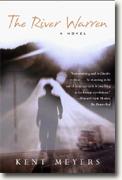 The characters in your novel seem to be locked in their roles, whether hard-drinking, hard-working cowboys or reservation Indians inhabiting the only land left for them. What has led to this terrible acceptance of limited life? Please explain.
The characters in your novel seem to be locked in their roles, whether hard-drinking, hard-working cowboys or reservation Indians inhabiting the only land left for them. What has led to this terrible acceptance of limited life? Please explain.
The statement seems too general for what really happens with the characters, many of whom do free themselves from demons, from histories, from pasts, from roles: Willi’s father, who finds a future, though his own parents wouldn’t give him one; Norman Walks Alone, who, through humor and perseverance and outright generosity and love, comes to recognize spirit in the world; Earl, who sees a world beyond the reservation and strives for it, while eventually coming to see the value of the place where he was raised; Willi, who outsmarts and evades the clutches of his grandmother; Rebecca, who leaves Magnus; Carson, who, while wanting to stay on the land and who ends up “landless and womanless,” is nevertheless certainly not friendless, who brings the other three young men to witness and help with the house-burning, which I think demonstrates an immense growth and freedom and expansiveness for him; even Ted, who, though he is left feeding his dogs burritos, and has a hard road ahead of him, has rejected suicide and perhaps alcoholism. I guess I’m having a hard time seeing any of these people as “locked in their roles,” or accepting “limited life.”
The only person I can think of who is, for much of his life “locked” into a role he doesn’t like (other than Magnus himself) is Charles Fielding, but even he comes to see other opportunity and takes it. We may not like that it comes through Magnus, but we can’t blame Charles for the source of his possible freedom from a life he wants out of.
I do think that land is very demanding; you cannot just leave it, go away from it, take a vacation from it. It has to constantly be “husbanded” and worked and tended. It is a relationship. Perhaps this is what you’re getting at with the question, this underlying sense in the novel that the land is there, the beings that inhabit it are there, the responsibility is there, and none of these things can be taken lightly by thoughtful people. We certainly do live in a culture where most of these kinds of responsibilities are hidden from us, and so we have a tendency to believe that “anything is possible.” But of course, not anything is possible; there always are limits on lives, and we must constantly adjust our lives according to limits—environmental, social, political, individual.
As an artist, I think that “restraint”—why people restrain themselves, in anything—is a more interesting question, with far more complex and subtle answers, than the one of why they don’t exercise such restraint. To return to Charles Fielding—while we may be hugely frustrated with what seems to be a passivity in him, a stoic acceptance of his “fate,” deep underneath, as Carson finally recognizes (and as Marie has recognized all along), is an active restraint (made absolutely clear, I think, in the final chapter) that is loving, kind, generous, subtle and complex. Charles is hardly paralyzed by restraint. Instead, he allows others to be become who they are by it—most notably his own son. Again, I guess I’m trying to deal with the ambiguity of human lives.
While loving his grandfather, Carson failed to establish the same emotional bond with his father. Why did Charles Fielding allow this to happen? Does Charles realize what this decision will cost him?
Well, this is one of the great ironies of the book, and a continuation of my answer above—that Charles, in trying to raise his son differently than he was himself raised, ends up giving Carson the freedom to gravitate to Yes. No, I don’t think Charles realizes what will happen. But that’s the great mystery of parenting—we don’t know, and we often can’t plan, how our children turn out, and children are who they are in spite of us.
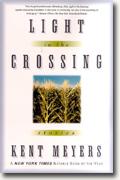 Your love for the land is obvious, also your respect for its power. Can you talk a bit about how this land infuses your writing and the scene of your novel?
Your love for the land is obvious, also your respect for its power. Can you talk a bit about how this land infuses your writing and the scene of your novel?
I was raised on a farm and wrote about that upbringing in a book of essays titled The Witness Of Combines. In that book I discuss how my imagination was shaped at an early age by the story of the glaciers that covered the northern plains. While the land I write about in this current novel wasn’t shaped by those glaciers, I think I do have a strong sense of how powerful and ancient are the forces that shape land—and in shaping land, shape the people who lived upon it.
What impression or insight would you most like your reader's to come away with after reading The Work of Wolves?
I’d be pretty disappointed if people didn’t understand the title, the idea at the center of the book that when human beings change an environment and its relationships, they have to do the “work” those other beings did—or suffer consequences. That is a deep moral and environmental issue that centers the novel. It may not be the single most important thing I want people to “get,” but I’d sure want them to see it somehow.
Are there any particular authors who have influenced your work?
Peter Matthiessen, Gabriel Garcia Marquez, Chaucer, Leslie Marmon Silko, Louise Erdrich, J. M. Coetzee, Cormac McCarthy, Carlos Fuentes—there are many writers I greatly admire and who have in one fashion or another influenced how I think and use language.
Do you have any advice for would-be writers?
Nothing they haven’t heard before: read a lot and read widely; write every day; never be satisfied with a first or a second or a third or a fourth draft, and be very suspicious of the fifth also; re-type entire manuscripts rather than word-process them, so that you feel the language at that intimate level again; take the advice of good critics, but make it your own rather than take it at face value; get a day job.
KENT MEYERS is the author of The River Warren, Light in the Crossing, and The Witness of Combines. He lives in Spearfish, South Dakota, where he teaches at Black Hills State University.
Contributing reviewer Luan Gaines interviewed Kent Meyers, author of The Work of Wolves (see accompanying review), about his book via email for curledup.com. No part
of this interview may be reproduced without permission. Luan Gaines/2005.





